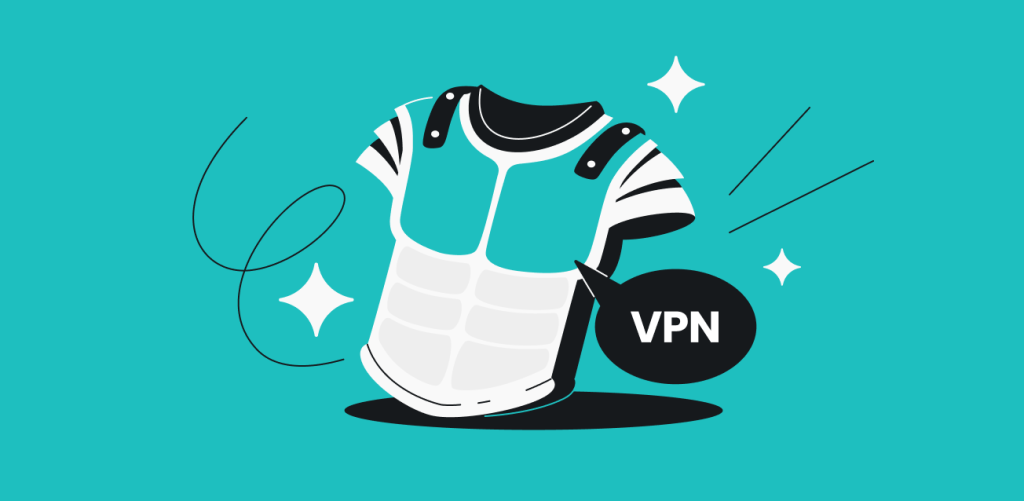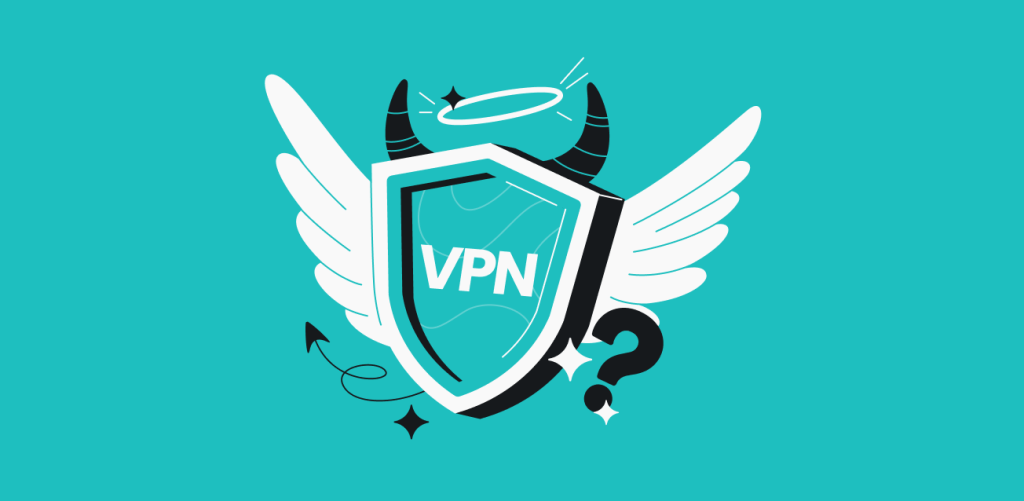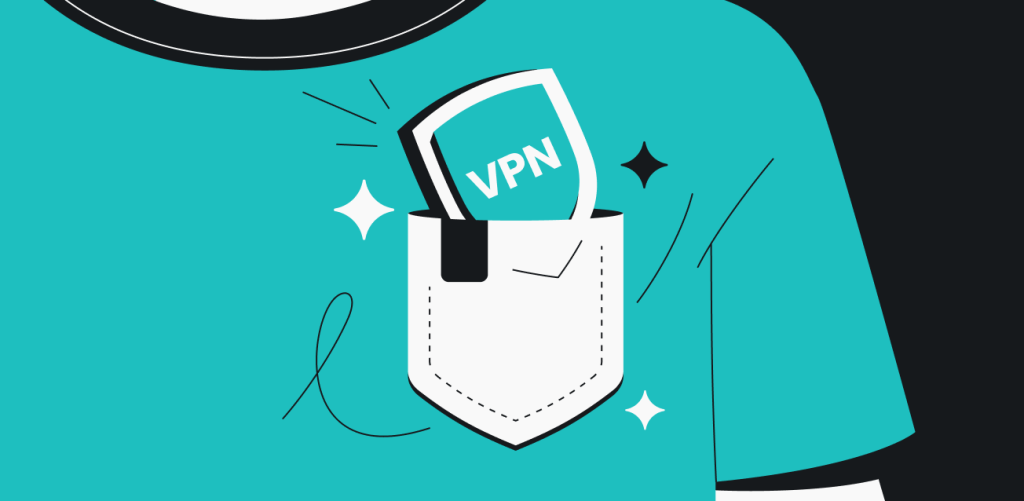
Security is by far the most important feature of a VPN (Virtual Private Network). Most of us use VPN services to protect our sensitive information. And choosing the right provider may be the difference between a secure online experience and your data getting leaked.
Needless to say, it is crucial to choose a service that will keep you safe. Follow along to learn what makes a VPN secure and what you should look for before committing to a long-term subscription.
Table of contents
How does a VPN keep you safe online?
A VPN protects your internet traffic by sending it to a VPN server before passing it on to the website or app you’re using. The data travels through an encrypted VPN tunnel, so if some third party were to intercept your connection, they’d see random gibberish instead of your precious sensitive information.
In simpler terms, a VPN protects your data from malicious or intrusive third parties and hides your physical location by changing your IP address to that of a VPN server.
How to choose the safest VPN
Secure encryption is the main building block for any secure VPN. AES-256 encryption is used for most VPN protocols, while ChaCha20 is the go-to option for WireGuard. That said, most premium VPN service providers use these encryption protocols, so you’ll have to dig a bit deeper to determine which ones have the security you need.
Here are the key security features to look for when choosing a VPN provider:
- Encryption — AES-256 for OpenVPN and IKEv2, ChaCha20 for WireGuard;
- Modern VPN protocols — outdated protocols can have security flaws, so choose a VPN with modern protocols. WireGuard, OpenVPN, IKEv2 are among the best. Some providers have proprietary protocols as well;
- No-logs policy — any trustworthy VPN should have a no-logs policy in place, preferably one that has been confirmed by an independent audit;
- Jurisdiction — make sure the VPN providers’ headquarters are located in a country with no data retention laws;
- RAM-only servers — VPN server infrastructure matters when it comes to security. RAM-only servers mean that no data is being stored in physical hard drives, which protects the users in case a server is physically breached;
- Kill switch — a feature that shuts off your internet connection if your VPN connection suddenly drops so that your data doesn’t get leaked. Having a kill switch is an essential part of the security suite for any VPN;
- Double VPN — this feature simultaneously connects you to two VPN servers. According to the Surfshark VPN Product Manager Justas Pukys, users “must consider using MultiHop (Double VPN) locations, which offer enhanced security for online activities.”
- Additional security features — some VPNs go out of their way to provide you with a safe internet experience and offer features outside of what you’d expect from a VPN. This could include an ad blocker, an antivirus, a password manager, and more.
Finding a VPN you can trust may also be easier if you look for recommendations from users who share their experiences about the best VPNs and even link to the best VPN offers available on the market.
A closer look at the best VPNs for security
Now that you know what you should look for when choosing a VPN provider, let’s look at some of the leading VPN providers and what they offer.
Surfshark
Let’s be honest — you knew this was coming. You’re reading the Surfshark blog, after all. That said, I do believe that Surfshark should be a part of any similar list based on the security it offers.
As you’d expect from a premium VPN provider, Surfshark uses industry-leading encryption and modern VPN protocols. It also has a kill switch to keep you safe at all times. Surfshark is based in the Netherlands, a country with no data retention laws, and has had its no-logs policy confirmed by Deloitte, one of the Big Four auditing firms.
Surfshark’s entire server infrastructure is RAM-only. The service also has Dynamic MultiHop, a double VPN solution for the times when you need an extra kick to your security. An ad blocker and a cookie pop-up blocker are all included in the base plan, which protects you from pesky and potentially malicious third-party ads and pop-ups.
If you choose to go with the Surfshark One subscription, you get an antivirus, real-time data breach alerts, personal data security reports, and access to a private search engine. This means that you get a security suite that keeps you protected and lets you know if things go south and your data gets leaked.
NordVPN
NordVPN has all the essential parts of a secure VPN. Of course, you’d expect nothing less from the biggest player in the VPN game. NordVPN uses secure AES-256 encryption, has an independently-audited no-logs policy, RAM-only servers, a kill switch, and headquarters in a country without data retention laws.
While it doesn’t offer a WireGuard option, it does have NordLynx — a proprietary protocol built around WireGuard. The base plan also includes an ad and tracker blocker, malware protection, and a double VPN.
If you’re willing to spend a bit extra to upgrade your subscription, NordVPN offers a password manager, data breach scanner, and encrypted storage with its more expensive plans.
Key takeaway: both NordVPN and Surfshark offer secure encryption, modern VPN protocols, kill switch, double VPN, and audited no-logs policies. The difference is that NordVPN can offer a password manager and encrypted storage, while Surfshark has a private search engine and personalized data security reports.
Check out our Surfshark vs. NordVPN blog post for a detailed comparison of these VPN providers.
ExpressVPN
Just like the providers above, ExpressVPN offers secure encryption, protocols, RAM-only servers, a kill switch, and an audited no-logs policy. Similarly to NordVPN, ExpressVPN doesn’t use WireGuard but has a proprietary protocol, Lightway, instead.
The service also includes a password manager and an ad blocker. And that’s included with all subscriptions — ExpressVPN doesn’t offer different packages for its users. Notably, the price for an ExpressVPN subscription is still more expensive than the priciest Surfshark plan.
When it comes to additional features, there’s also room for improvement — ExpressVPN doesn’t offer features such as a double VPN, an antivirus, or leak protection.
Key takeaway: ExpressVPN has the essential parts of a secure VPN, but it doesn’t go out of its way to provide a more secure internet experience outside of what a VPN usually does. If you want an enhanced online security suite, you’d be better off with Surfshark or NordVPN instead.
For a deeper dive into ExpressVPN and its features, take a look at our Surfshark vs. ExpressVPN comparison guide.
CyberGhost
CyberGhost uses AES-256 and ChaCha20 encryption together with WireGuard, OpenVPN, and IKEv2 protocols. It has a kill switch, RAM-only servers, and an independently audited no-logs policy, which means it ticks all the essential boxes for a secure VPN.
CyberGhost also offers an ad blocker, a data breach alert, and has partnered up with Intego to provide antivirus protection for its users, but it only works on Windows. So if you’re using macOS, iOS, Android, or any other operating system — you’re out of luck.
The service lacks a double VPN and doesn’t offer additional services such as a password manager. When it comes to pricing, CyberGhost has only one subscription package, so everything is included in the base price.
Key takeaway: CyberGhost is up there with the big three of Surfshark, NordVPN, and ExpressVPN when it comes to essential security features. It also offers an antivirus for Windows and a data breach alert without charging extra for it.
When compared to Surfshark, CyberGhost lacks double VPN and private search functionality. Check out our blog for an in-depth Surfshark vs. CyberGhost comparison.
Private Internet Access
You can’t cheap out on privacy and security features with a name like Private Internet Access (PIA). Interestingly enough, it’s the only provider on this list to offer a choice between AES-128 and AES-256 encryption. AES-128 is considered to be less secure, so make sure to pick the AES-256 option whenever you connect to their services.
Other than that, the service offers exactly what you’d expect — OpenVPN, IKEv2, and WireGuard as VPN protocol options, an audited no-logs policy, RAM-only servers, and a kill switch to keep you safe. It doesn’t have a breach alert but has Identity Guard, a feature that lets you manually check if your data has been compromised.
On top of that, PIA includes a feature that blocks ads and trackers, as well as a double VPN in the base subscription. You also have the option to get an antivirus as a paid add-on to enhance your digital security.
Key takeaway: PIA offers a solid security suite, only lacking a cookie pop-up blocker and private search functionality when compared to Surfshark.
Find the full Surfshark vs. PIA comparison on our blog.
IPVanish
Here’s a short list of things you’re probably already tired of reading:
- Secure encryption;
- Modern VPN protocols;
- Independently audited no-logs policy;
- Kill switch.
And yet, IPVanish has them all and they should be mentioned whenever you’re making a VPN comparison. The service also filters out malicious ads, pop-ups, and websites as part of its Threat Protection package, but it doesn’t offer a full antivirus service and doesn’t protect you from malicious files.
That said, IPVanish still uses hard drives in its servers instead of migrating to a RAM-only infrastructure. On top of that, it has no double VPN feature. So if you’re a whistleblower or someone who needs that extra touch of security, IPVanish might not be the perfect option for you.
Key takeaway: IPVanish has a solid security core, but lacks a RAM-only infrastructure and some additional features that other premium VPN providers may have. These include an antivirus, a double VPN, and a password manager, among others.
Check out our Surfshark vs. IPVanish comparison to learn how these two providers match up.
ProtonVPN
ProtonVPN uses AES-256 encryption for OpenVPN and IKEv2 together with ChaCha20 for WireGuard. It’s also based in Switzerland, a country with no data retention laws, and has an independently audited no-logs policy. In other words, ProtonVPN ticks the boxes that all other providers above do as well.
The service is yet to make the move to RAM-only servers, but it does offer double VPN functionality through what they call Secure Core. It first routes your traffic through servers in privacy-friendly countries before sending your data to its final destination.
ProtonVPN also has an ad and pop-up blocker but doesn’t offer any antivirus functionality or features like a password manager and encrypted storage.
Key takeaway: ProtonVPN lacks some additional security features and RAM-only infrastructure that the biggest names in the industry have. So while it does cover most of the essentials for a secure service, it does leave something to be desired.
You can see exactly how it compares to a top VPN service by reading our Surfshark vs. ProtonVPN overview.
Mullvad
Mullvad is the smallest VPN provider on this list of secure VPN services. That said, it still offers secure encryption, modern protocols, and a kill switch. On top of that, Mullvad has features like a private search engine and even a unique private browser.
At the same time, the service lacks some essential features, such as RAM-only servers or an independent audit of its no-logs policy. It does state that an independent audit of Mullvad’s server infrastructure found no leaks or logging, but it’s still a server audit, not one dedicated to the no-logs policy itself.
Mullvad has always been a niche provider with more of a focus on privacy than security, and while the two are closely related, they’re not the same thing. This results in some cool privacy features, such as cash payment, that don’t do much to secure your online experience.
Key takeaway: while Mullvad does have its place in the market for privacy-oriented VPN users, it has a hard time competing with the heavy hitters of the VPN world when it comes to security features.
If you want to learn more about Mullvad, check out our Surfshark vs. Mullvad comparison article.
So, what’s the safest pick?
There’s no single answer to what is the most secure VPN service. That’s because it depends on the needs of the user, not only on the provider. So make sure that the provider you’re looking at has all the essentials covered, and then make your choice depending on the additional features they offer.
FAQ
Does a VPN make you 100% secure?
No, a VPN doesn’t make you completely secure online. A VPN can’t protect you from giving out your personal information via social media or through the accounts you create on various websites. A VPN also won’t protect you from malware unless you choose a service that also offers antivirus protection.
A VPN protects you from anyone trying to snoop on your data. This may include hackers, intrusive ISPs, websites, and oppressive governments. But a VPN without additional features doesn’t prevent you from posting your own personal data online or save you from clicking on malicious links.
What is the most secure way to use a VPN?
To use a VPN securely, you first need to make sure that you’re using a reputable, premium VPN service. A free VPN can hurt, not protect, your online security and privacy. If you want an extra kick to your security, consider using a double VPN or onion over VPN.
What is the most secure VPN protocol?
A secure VPN protocol should be open source and have withstood the test of time without showing security vulnerabilities. As of right now, OpenVPN, IKEv2, and WireGuard are considered the best choices, with some big providers also offering their own proprietary protocols.
What is the safest free VPN?
You probably shouldn’t even be looking at free VPNs if you’re looking for security. That said, if you must use a free service, look for a freemium VPN. Freemium VPNs offer some free functionality but restrict the number of servers and the amount of data you can use while offering a lot more with paid options.
Such VPNs tend to make their money from users who choose the paid options. The same can’t be said about completely free VPNs that may sell user data or show an obscene amount of ads just to make ends meet. So, to be safe, we recommend downloading a VPN app that is both high-quality and pocket-friendly, like Surfshark.





